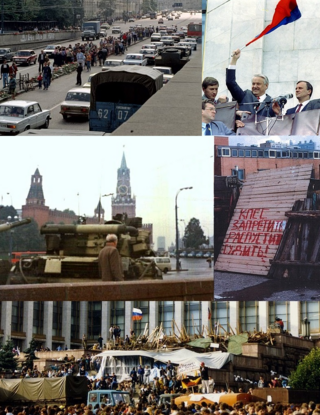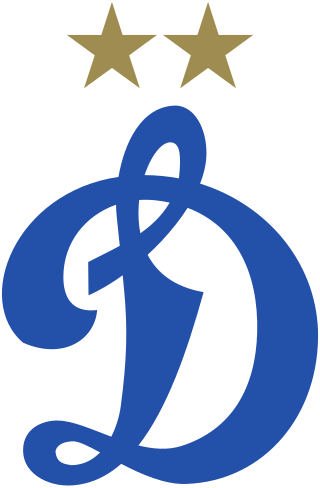
Moscow is the capital and largest city of Russia. The city stands on the Moskva River in Central Russia, with a population estimated at 13.0 million residents within the city limits, over 18.8 million residents in the urban area, and over 21.5 million residents in the metropolitan area. The city covers an area of 2,511 square kilometers (970 sq mi), while the urban area covers 5,891 square kilometers (2,275 sq mi), and the metropolitan area covers over 26,000 square kilometers (10,000 sq mi). Moscow is among the world's largest cities, being the most populous city entirely in Europe, the largest urban and metropolitan area in Europe, and the largest city by land area on the European continent.

Russia, or the Russian Federation, is a country spanning Eastern Europe and Northern Asia. It is the largest country in the world by area, extends across eleven time zones, and shares land boundaries with fourteen countries. It is the world's ninth-most populous country and Europe's most populous country. The country's capital and largest city is Moscow. Saint Petersburg is Russia's cultural centre and second-largest city. Other major urban areas in the country include Novosibirsk, Yekaterinburg, Nizhny Novgorod, Chelyabinsk, Krasnoyarsk, and Kazan.

The Russian Orthodox Church, alternatively legally known as the Moscow Patriarchate, is an autocephalous Eastern Orthodox Christian church. It has 194 dioceses inside Russia. The primate of the ROC is the Patriarch of Moscow and all Rus'.

The Moscow Kremlin, also simply known as the Kremlin, is a fortified complex in the center of Moscow. It is the best known of the kremlins, and includes five palaces, four cathedrals, and the enclosing Kremlin Wall with Kremlin towers. In addition, within the complex is the Grand Kremlin Palace that was formerly the residence of the Russian emperor in Moscow. The complex now serves as the official residence of the Russian president and as a museum with almost three million visitors in 2017. The Kremlin overlooks the Moskva River to the south, Saint Basil's Cathedral and Red Square to the east, and Alexander Garden to the west.

The Battle of Moscow was a military campaign that consisted of two periods of strategically significant fighting on a 600 km (370 mi) sector of the Eastern Front during World War II, between September 1941 and January 1942. The Soviet defensive effort frustrated Hitler's attack on Moscow, the capital and largest city of the Soviet Union. Moscow was one of the primary military and political objectives for Axis forces in their invasion of the Soviet Union.

The 1991 Soviet coup d'état attempt, also known as the August Coup, was a failed attempt by hardliners of the Soviet Union's Communist Party to forcibly seize control of the country from Mikhail Gorbachev, who was Soviet President and General Secretary of the Communist Party at the time. The coup leaders consisted of top military and civilian officials, including Vice President Gennady Yanayev, who together formed the State Committee on the State of Emergency (GKChP). They opposed Gorbachev's reform program, were angry at the loss of control over Eastern European states and fearful of the USSR's New Union Treaty which was on the verge of being signed. The treaty was to decentralize much of the central Soviet government's power and distribute it among its fifteen republics.

Professional Football Club CSKA , commonly referred to as CSKA Moscow or CSKA Moskva outside of Russia, or simply as CSKA, is a Russian professional football club. It is based in Moscow, playing its home matches at the 30,000-capacity VEB Arena. It plays in red and blue colours, with various plain and striped patterns having been used.

FC Dynamo Moscow is a Russian professional football club based in Moscow. Dynamo returned to the Russian Premier League for the 2017–18 season after one season in the second-tier Russian Football National League.

FC Lokomotiv Moscow is a Russian professional football club based in Moscow. Lokomotiv have won the Russian Premier League on three occasions; the Soviet Cup twice; and the Russian Cup a record nine times. After the 2022 Russian invasion of Ukraine, the European Club Association suspended all Russian teams from participation in international competition.

The International Lenin Peace Prize was a Soviet Union award named in honor of Vladimir Lenin. It was awarded by a panel appointed by the Soviet government, to notable individuals whom the panel indicated had "strengthened peace among comrades". It was founded as the International Stalin Prize for Strengthening Peace Among Peoples, but was renamed the International Lenin Prize for Strengthening Peace Among Peoples as a result of de-Stalinization. Unlike the Nobel Prize, the Lenin Peace Prize was usually awarded to several people a year rather than to just one individual. The prize was mainly awarded to prominent Communists and supporters of the Soviet Union who were not Soviet citizens. Notable recipients include W. E. B. Du Bois, Fidel Castro, Lázaro Cárdenas, Salvador Allende, Mikis Theodorakis, Seán MacBride, Angela Davis, Pablo Picasso, Oscar Niemeyer, Faiz Ahmad Faiz, Abdul Sattar Edhi, Funmilayo Ransome-Kuti, CV Raman and Nelson Mandela.

The Russian Premier League, also written as Russian Premier Liga, is the top division professional association football league in Russia. It was established at the end of 2001 as the Russian Football Premier League and was rebranded with its current name in 2018. From 1992 through 2001, the top level of the Russian football league system was the Russian Football Championship.

Football Club Torpedo Moscow, known as Torpedo Moscow, is a Russian professional football club based in Moscow that currently plays in the Russian First League, the second tier of Russian football, after being relegated from the Russian Premier League in the 2022-23 season. Their colours are white and black, with green also commonly being associated with the club. They play their home games at Eduard Streltsov Stadium, but have been playing at Luzhniki Stadium since their home stadium began a reconstruction project in 2021.
The Soviet Top League, known after 1970 as the Higher League, served as the top division (tier) of Soviet Union football from 1936 until 1991. The league's name was a conditional designation used for brevity since being completely owned and governed by the Football Federation of the Soviet Union. The full official name was USSR Championship in football: Top League. An attempt to create fully professional league as autonomously governed organization during "perestroika" period was denied by Federation due to political culture in the Soviet Union.

The Academy of Sciences of the Soviet Union was the highest scientific institution of the Soviet Union from 1925 to 1991. It united the country's leading scientists and was subordinated directly to the Council of Ministers of the Soviet Union.

Valery Georgiyevich Gazzaev is a Russian politician, football manager and former footballer of Ossetian descent. As a Soviet footballer he played the position of a striker enjoying successes with his team FC Dynamo Moscow as well as the USSR national football team in the Olympics.

The Soviet Hockey Championship was the highest level ice hockey league in the Soviet Union, running from 1946 to 1992. Before the 1940s the game of ice hockey was not cultivated in Russia, instead the more popular form of hockey was bandy. Following the dissolution of the USSR, the league was temporarily renamed the CIS Championship in 1992. This organization was the direct predecessor of the International Hockey League, and subsequent Russian Superleague (RSL) and current Kontinental Hockey League (KHL).

Boris Nikolayevich Yeltsin was a Soviet and Russian politician who served as the first president of Russia from 1991 to 1999. He was a member of the Communist Party of the Soviet Union from 1961 to 1990. He later stood as a political independent, during which time he was viewed as being ideologically aligned with liberalism and Russian nationalism.

The Russian Soviet Federative Socialist Republic, previously known as the Russian Soviet Republic and the Russian Socialist Federative Soviet Republic, as well as being unofficially referred to as Soviet Russia, the Russian Federation, or simply Russia, was an independent federal socialist state from 1917 to 1922, and afterwards the largest and most populous Soviet socialist republic of the Soviet Union (USSR) from 1922 to 1991, until becoming a sovereign part of the Soviet Union with priority of Russian laws over Union-level legislation in 1990 and 1991, the last two years of the existence of the USSR. The Russian SFSR was composed of sixteen smaller constituent units of autonomous republics, five autonomous oblasts, ten autonomous okrugs, six krais and forty oblasts. Russians formed the largest ethnic group. The capital of the Russian SFSR and the USSR as a whole was Moscow and the other major urban centers included Leningrad, Stalingrad, Novosibirsk, Sverdlovsk, Gorky and Kuybyshev. It was the first Marxist–Leninist state in the world.

The Medal "For the Defence of Moscow" was a World War II campaign medal of the Soviet Union awarded to military and civilians who had participated in the Battle of Moscow.


















